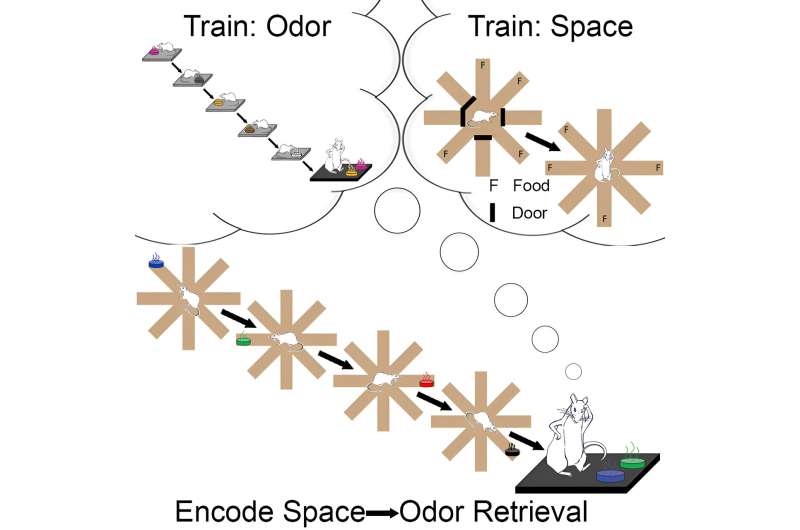This article has been reviewed according to Science X's editorial process and policies. Editors have highlighted the following attributes while ensuring the content's credibility:
fact-checked
peer-reviewed publication
trusted source
proofread
Neuroscientists find that animals replay incidentally encoded episodic memories

Indiana University neuroscientists have found the first evidence that rodents can call upon their episodic memory—the ability to recall seemingly unimportant streams of events from the past—and use incidentally encoded information to answer unexpected questions.
This breakthrough in neuroscience research, which expands on a 2018 study that first reported evidence that animals can replay past events, could potentially lead to advancements in the development of therapies that specifically target episodic memory loss for Alzheimer's disease patients.
The study, led by IU graduate student Cassandra Sheridan, is published in Current Biology.
Sheridan, in collaboration with Provost Professor of Psychological and Brain Sciences Jonathon Crystal in the College of Arts and Sciences at IU Bloomington, sought to observe whether rats can draw on a stream of past memories to answer unexpected questions.
It's widely assumed that using primates in cognition research will yield the most valuable and accurate results. However, Crystal and his lab believe that precursors of cognition may be more widespread in the animal kingdom than just being an enhancement that evolved with primates. Rats also exhibit remarkable olfactory specialization, which is a key aspect of this study.
"Using rats can help further the field of memory by providing a way to identify and measure behavioral patterns and changes that are more sophisticated and complex than mouse models, as well as model diseases like Alzheimer's to test treatments before they reach the clinical stages," Sheridan said. "This is what I am most excited about."
Crystal's lab created an experiment scenario that would require rats to use episodic memory to solve a series of tests. Researchers gave nine rats a list of odors using many common household spices, like cinnamon and paprika. Then, the rats were given a memory assessment where they were presented with two scents from the previous list. The rats must then choose which scent was the third-to-last scent presented.
To assess whether the rats could combine their ability to replay episodic memories with the ability to answer unexpected questions, researchers placed rats in a radial maze where they were confronted with scented lids covering food. After the rats foraged through the maze, they were presented with the opportunity to report the third-to-last scent, having to draw from memory the previously presented scents.
The rats remembered multiple pieces of putatively unimportant information and later replayed a stream of episodic memories when that information was needed to solve an unexpected problem. The first and only trial run ended with a 100 percent success rate.
Until this study, there was no scientific evidence that non-human animals were capable of replaying streams of incidentally encoded episodic memories.
"What we wanted to test is a property of what people do in everyday life that has never been shown in a non-human animal," Crystal said. "We remember information even though it was seemingly unimportant when it was encountered. When we happen to need that information, we replay the stream of events to identify the information needed to solve our current problem."
This development in episodic memory research could have an incredible impact on future Alzheimer's research, Crystal said. Alzheimer's drug and therapy development has a high failure rate due to the poor translatability from animal models to human treatments. According to Crystal, most Alzheimer's research and clinical trials that use animal models typically focus on cognition broadly, not narrowly on episodic memory.
"That could be part of the puzzle of why translational failure occurs," Crystal said. "What you really want to know when you test Alzheimer's patients is that there is relief in remembering that their granddaughter visited last week and talked about interesting things going on in her life. Those are the things that are going to produce huge societal changes when the drugs are effective, not just at general aspects of memory but specifically targeting episodic memory."
More information: Cassandra L. Sheridan et al, Replay of incidentally encoded episodic memories in the rat, Current Biology (2024). DOI: 10.1016/j.cub.2023.12.043


















